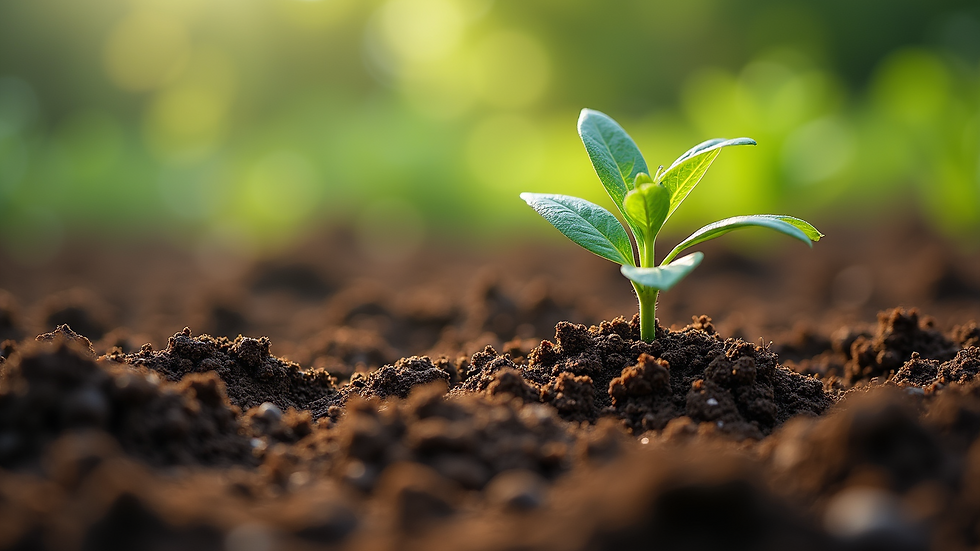The Evolving Impact: Uncovering the Secrets of Bio Fertilizers and Soil Enrichment
- Rajashekhar Rathod
- Mar 18, 2025
- 4 min read
In the fight against soil degradation and the search for sustainable farming techniques, bio fertilizers are gaining significant attention. Intensive farming practices and heavy chemical fertilizer use have severely harmed soil health. In light of these issues, bio fertilizers harness the power of helpful microorganisms to boost soil productivity and overall health. These natural solutions not only enhance crop growth but also contribute to a more sustainable agricultural future.
To fully appreciate the role of bio fertilizers, it is essential to examine how they work, their benefits for soil enrichment, and their implications for sustainable farming practices.
Understanding Bio Fertilizers
Bio fertilizers are natural products containing living microorganisms that enhance nutrient availability for plants. Unlike chemical fertilizers, which provide immediate nutrients, bio fertilizers promote long-term health for the soil. They typically contain bacteria, fungi, or algae and can be applied directly to soil or seeds.
These microorganisms perform essential tasks. For example, they fix atmospheric nitrogen, mobilize phosphorus, and improve nutrient uptake. They also enhance soil structure, making it easier for plants to grow. A field trial in India indicated that using bio fertilizers led to a 30% increase in crop yield for rice compared to fields treated with synthetic fertilizers.
The Mechanisms of Soil Enrichment
Nitrogen Fixation
Nitrogen fixation is one of the most significant benefits of bio fertilizers. Certain bacteria, like Rhizobium, form partnerships with leguminous plants to convert atmospheric nitrogen into a form that plants can use. This process reduces reliance on synthetic nitrogen fertilizers. In fact, leguminous crops treated with bio fertilizers have been shown to reduce the need for chemical inputs by up to 50%, promoting healthier soil ecology.
Phosphorus Solubilization
Phosphorus is another key nutrient often limited in soils. Many bio fertilizers contain microbes like mycorrhizal fungi. These fungi solubilize phosphorus from soil and make it accessible to plants. A study indicated that mycorrhizal treatments can enhance phosphorus availability by 65%, leading to healthier crops and a more diverse soil community.
Organic Matter Decomposition
Bio fertilizers also facilitate the breakdown of organic matter in soil. When microorganisms decompose these materials, they release valuable nutrients back into the ground, boosting overall fertility. This natural process can improve soil texture and water retention. Research has shown that bio fertilizers can enhance soil organic matter levels by as much as 15% in three years, significantly benefiting agricultural productivity.

Benefits of Bio Fertilizers
Enhancing Soil Health
Bio fertilizers significantly enhance soil health. Introducing beneficial microorganisms increases biodiversity within the soil ecosystem. This diversity helps suppress soil-borne diseases and pests, which leads to less dependence on chemical pesticides. For instance, farms using bio fertilizers observed a 40% reduction in pest-related crop losses compared to those relying solely on chemicals.
Sustainable Agricultural Practices
By minimizing chemical inputs, bio fertilizers align with sustainable farming practices, addressing concerns about soil and water pollution. As awareness of environmental issues grows, farmers are increasingly looking for eco-friendly alternatives. Bio fertilizers serve as a viable option that maintains soil health while supporting sustainable crop production.
Improving Crop Yields
Research indicates that bio fertilizers can significantly boost crop yields. For instance, a study showed that wheat yields increased by 20% when bio fertilizers were used, compared to fields treated with conventional methods. This growth is vital as the global population continues to rise, highlighting the need for increased food production without damaging the environment.
Cultivating Bio Fertilizers: Methods and Considerations
Production Techniques
Farmers can produce bio fertilizers through composting, fermentation, or culturing microorganisms. Utilizing local resources, such as food waste and animal manures, can be a cost-effective way to create these fertilizers and enhance resource efficiency. For example, using farm residues to generate bio fertilizers can reduce production costs by up to 30%.
Application Methods
Application methods for bio fertilizers can vary based on crop type and microorganisms used. Common methods include seed treatment, soil mixing, and foliar sprays. Each technique provides unique benefits, and farmers should choose the method that best fits their crops and soil characteristics.
Monitoring Soil Health
To maximize the effectiveness of bio fertilizers, monitoring soil health is crucial. Farmers should regularly assess and adjust soil pH, nutrient levels, and microbial activity. This ongoing evaluation helps ensure that soils remain fertile. Studies have shown that farms that monitor these metrics can see a yield increase of 15% due to tailored fertilizer applications.
Future Directions in Soil Enrichment
The future of bio fertilizers is bright as research discovers new microorganisms and their benefits. Advancements in genetics have initiated the search for specific strains that enhance nutrient cycling and disease resistance. As consumer demand for organic and sustainably-grown products increases, bio fertilizers' role in contemporary agriculture will likely expand.
Additionally, governments and agricultural bodies are starting to prioritize sustainable practices. This recognition will likely accelerate the widespread adoption of bio fertilizers, further solidifying their importance in modern farming.
Embracing the Revolution in Soil Enrichment
Bio fertilizers signify an important shift toward sustainable agriculture and soil enrichment. By leveraging the natural abilities of beneficial microorganisms, farmers can enhance soil health, boost crop yields, and contribute to a sustainable food system. As we continue to learn about bio fertilizers, their role in enriching soils and promoting eco-friendly practices will only grow.
The path toward sustainable farming is a shared journey. Embracing bio fertilizers is a crucial step in creating a healthier environment for future generations. These natural solutions combat soil degradation and nourish the earth, ensuring its fertility for years to come.





Comments